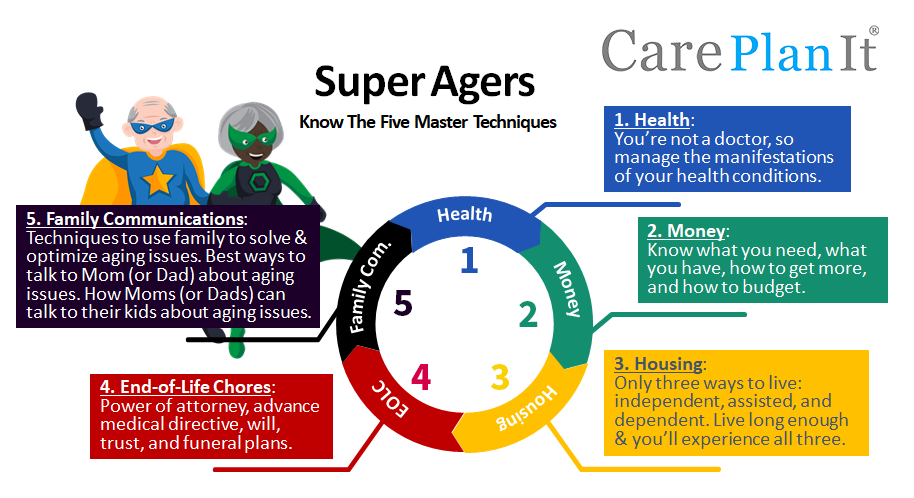Over the years, some of my favorite newspapers, including the New York Times, Boston Globe, Chicago Tribune, Miami Herald, and The Wall Street Journal, have published articles on a version of The Talk With Mom, or Mom and Dad. The Talk happens after something terrible has happened to Mom or Dad, like a car accident, fall injury, chronic health diagnosis, or financial problem, and centers on whether Mom or Mom and Dad, can maintain the status quo. It’s a talk children have with their parents about aging issues.

The Talk Is Difficult
By its nature, The Talk is difficult. No one wants to be challenged about their ability to live today like they lived yesterday. The Talk is hard for the kids and hard for the parents. Remember The Sex Talk? Except for this time, the kids act like the parents, and the parents are usually made to feel like the kids.
My favorite motivation for The Talk was a family in Chuckey, Tennessee. They became gravely concerned about their widowed father Joeseph’s ability to live alone after shooting his neighbor’s cow. The family was less worried about the dead cow than their father’s threat to shoot the cow’s wife if she kept asking to borrow his sugar. “I’m a happily married man; I don’t do that kind of thing,” he said. You’d think this would be an easy one.
They had The Talk around the Thanksgiving table with a local Doctor and Priest. The Doctor was there to persuade Joseph that he was no longer capable of living independently. The Priest was there to convince Joseph to visit the Church’s congregate senior living facility. The Talk didn’t go well. Joseph wanted the Doctor to recommend a treatment for his bunions, and all Joseph resolved with the Priest was to visit Father James to seek absolution for the dead cow and any harm done to the missus. He even offered compensation for the children.
Every Family Has The Talk
There comes a time for every family when a parent’s ability to live independently is challenged by their age and corresponding declines in mental and physical capabilities. However, society associates loss of independence with feebleness and decrepitude. Seniors know what this means: no car, no travel, reliance on others, and maybe being forced to leave their own home. And in Joseph’s case, no more visits from the heifer. In most cases, seniors don’t want to change their current lifestyles.
CarePlanIt.com was created based on how Super Agers approach age-related issues. They have a unique perspective on things like housing, health, finances, and family communication. They also do a bunch of end-of-life chores to ensure that their wishes are met. These Super Ager skills are pictured below.

We encourage you to visit and learn about how Super Agers approach issues if you’re a senior. If you’re a child of an aging parent, we encourage you to do the same. Start here.
Take The Lead As A Concerned Child
If your parents don’t appear to have their arms around the issues discussed, we recommend you go first. By going first, you can engage your parent’s in the process and seek their advice. They’re a lot further along in the aging process, and asking for their help and input also helps you gain insight into how much they’ve prepared and what they want. Let’s look at one possible interaction. It’s between Mary, fifty-five, and her mother Jane, eighty, around the Housing Master Technique.
“Mom, I’m looking at senior housing options for when I retire. I’ve noticed many options, from Church-run assisted living facilities to privately run facilities focused on wellness and personal enrichment. I’m even thinking about talking to Andrew (Mary’s oldest son) about whether he wants me to consider moving in with him and Barabara. They’ll probably have kids by then, and they’re so busy. You’re older and wiser than me. Can you help me work through these options?”
As Mary and her mother work through these senior housing options, Mary will learn a lot about what her mother has planned, wants, and is willing to consider. The worst thing Mary can discover is that her Mom hasn’t addressed the issues, doesn’t have an opinion, and isn’t open to discussion. This rarely happens; most parents have thoughts, and in the rare event Mary’s Mom doesn’t, it’s good knowledge to have.
When To Have The Talk
We’re not a big fan of having a detailed discussion over Thanksgiving. But if the family is willing and able, have The Talk, it’s better than not having one. We recommend the person Mom is closest to set up a time in the future to discuss long-term plans. We also recommend that you approach The Talk by going through the issues yourself with your Mom. Place your parent(s) in the position of expert. They’re more likely to feel empowered and have a more detailed discussion.
